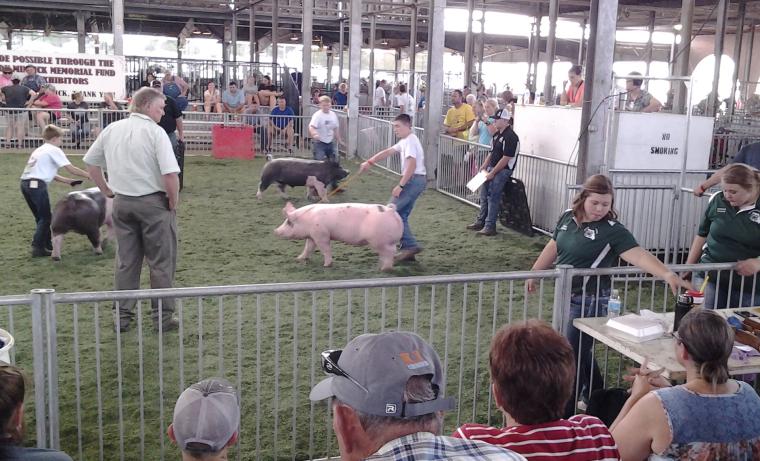COLUMBIA, Mo. – Biosecurity should be top of mind for those who show animals at county and state fairs, especially in the case of swine.
University of Missouri Extension veterinarian Cory Bromfield said she’s noticed less concern overall about African swine fever (ASF) among pork producers and those who show pigs. She calls it “ASF fatigue.”
“Producers have heard about African swine fever since 2018, when it was reported in China,” said Bromfield. “Over the next year or two it was often in the news, infecting a new country, and we were responding in the U.S., wanting to prevent it from coming here. While the disease has made it to the Western Hemisphere – Haiti and Dominican Republic – many people don’t consider how the U.S. is still at risk.”
Bromfield has noticed less motivation to work on things like the Secure Pork Supply Plans that can help prevent ASF in the U.S.
“We do have people who can help producers and pig owners with the Secure Pork Supply Plan,” she said. “Our National Animal Disease Preparedness Response Program federal grant pays for extension specialists to assist producers in creating their plans. It still requires input from them, but much more of the time-consuming portion can be taken off their plate.”
MU Extension is working with the Rapid Access Biosecurity (RAB) app, a database developed at North Carolina State University that will store the plans and make it easier for state animal health officials to make decisions in the case of an outbreak. Independent Missouri producers are urged to go through MU Extension to use the app.
How to get started with the RAB app
1. Contact the Missouri Department of Agriculture to register your farm. Call 573-751-3377 or go to Agri-Security.
2. Contact one of the MU Extension specialists listed below for assistance with the RAB app and the Secure Pork Supply Plan.
- Corinne Bromfield, swine extension veterinarian, bromfieldc@missouri.edu, 573-882-8181.
- Mag Lopez Soriano, livestock specialist (swine), mlopezsoriano@missouri.edu, 573-445-8375.
- Amie Schleicher, livestock specialist, NW Missouri, schleichera@missouri.edu, 660-744-6231.
- Zac Erwin, livestock specialist, NE Missouri, erwinz@missouri.edu, 660-665-9866.
What to do on-farm now
Especially now in fair season, there are easy things that people can do to improve their biosecurity, which will help not only in the case of ASF but will also help minimize transmission of the diseases already in the U.S. People think biosecurity needs to be intense and expensive, but small, consistent actions in the biosecurity mindset can pay big dividends, said Bromfield.
• Dedicated clothing. People taking animals to fairs should wear dedicated clothing and footwear at the fair and not bring the same clothes/footwear home to their other animals. This is also an important practice around animals staying on the farm. Dedicated clothing and footwear that doesn’t leave your farm also help minimize the chance of bringing something back to the farm.
• Isolate animals after the fair. If animals are returning to the farm after the show, house them away from the home herd for at least two weeks, and work with them after working with the home herd. Another option is terminal shows, where the animals will not return to the home herd.
• Bring home animals only. Don’t bring anything from the fair that doesn’t need to come home, such as food, shavings or manure. Wash the trailer to clean off manure. Always wash your hands after interacting with animals.
No matter the species – cattle, sheep, goats, etc. – biosecurity is essential in protecting the safety and welfare of all animals being shown.
Photos
Youths in the swine show ring
Youths in the swine show ring at a previous Missouri State Fair. Photo by Kendra Graham.
Cory Bromfield changes to dedicated boots
MU Extension veterinarian Cory Bromfield changes to dedicated boots as part of a biosecurity protocol before entering an animal area. University of Missouri photo.
Writer: Julie Harker
